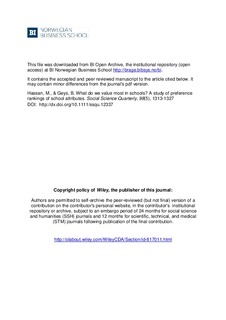What Do We Value Most In Schools? An Empirical Study of Stakeholders’ Preference Rankings of School Attributes
Journal article, Peer reviewed
Permanent lenke
http://hdl.handle.net/11250/2477569Utgivelsesdato
2017Metadata
Vis full innførselSamlinger
- Publikasjoner fra CRIStin - BI [1015]
- Scientific articles [2181]
Originalversjon
Social Science Quarterly, 2017, 98(5), 1313-1327 http://dx.doi.org/10.1111/ssqu.12337Sammendrag
Objectives
A key question in education policy as well as individuals’ school choice involves the characteristics of schools we value most. It is thereby important to understand any heterogeneity in parents’, teachers’, and school principals’ preference rankings driven by their education level, gender, and age.
Method
In this article, we propose a survey-based approach to examine preference rankings of diverse school attributes, which accounts for tradeoffs required in real-world choice situations.
Results
Our results indicate that stakeholders on average rank the “ethical” aspects of schools (such as pupil and staff happiness and equality of opportunities) above their “efficiency” aspects (such as academic achievement or school size). Yet, respondents’ role in the school as well as their education level, gender, and age influence observed preference rankings.
Conclusions
To avoid biased inferences, survey designs on school preferences should account for the fact that real-world choices in favor of one particular characteristic often imply giving up at least some others. Doing so, we show that parents, teachers, and school principals appear to disagree with the predominant consideration awarded to academic achievement in current education policies.
Beskrivelse
The accepted and peer reviewed manuscript to the article
